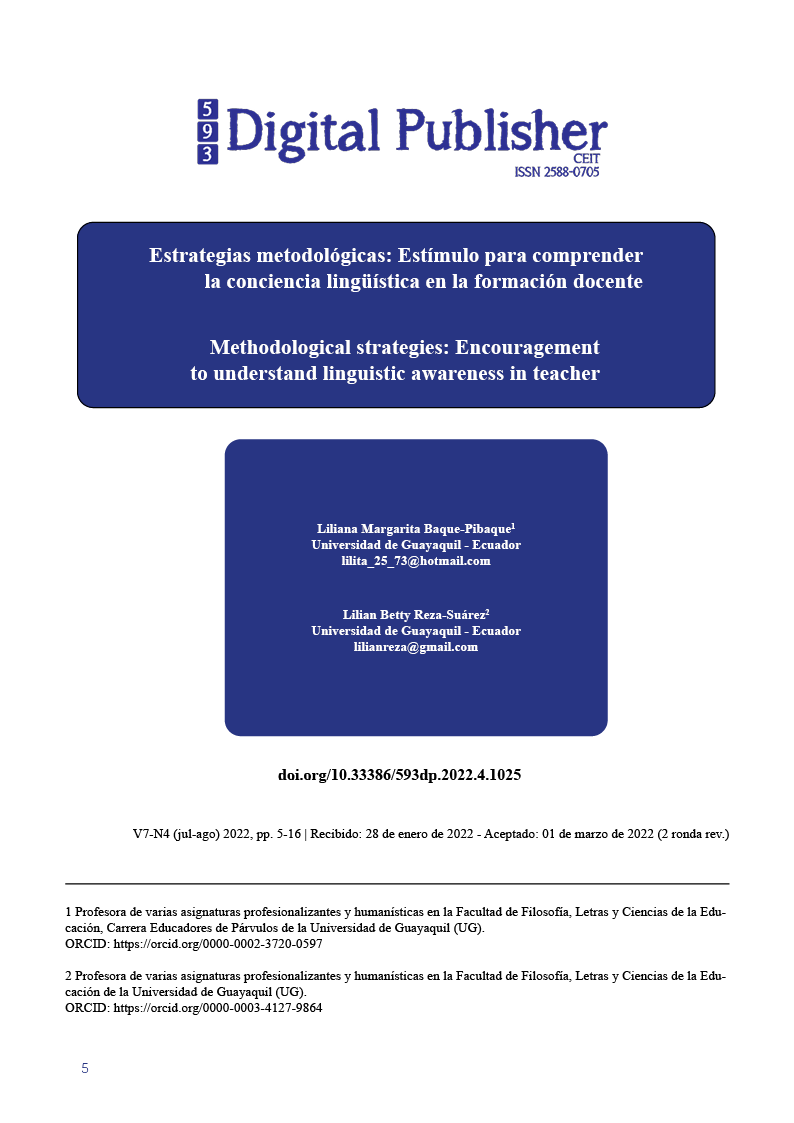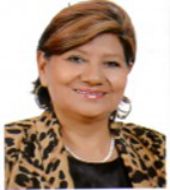Methodological strategies: Encouragement to understand linguistic awareness in teacher
Main Article Content
Abstract
The study carried out involves methodological strategies as a stimulus for the development of linguistic awareness in teacher training, from this perspective, it is necessary to contribute to this training to achieve the development of oral expression and reading comprehension of our children and young people. , according to the results of MINEDUC (2014), the percentages are very low and lacking to respond to the Ser Tests. The main objective was to develop a program of methodological strategies as a stimulus to understand linguistic awareness in the teacher training of Initial Education of the University From Guayaquil. To achieve this objective, research methods such as analytical, synthetic, inductive - deductive, constructivist approach, descriptive type were used. Of the empirical documentary study, observation, survey. This guaranteed the main results on the definitions of semantic and phonological awareness necessary for the beginning of oral expression, verbal and non-verbal manifestations in the first years of schooling, it is necessary for the teacher to use the appropriate strategies to favor the performance of children. and young people to respond to reading, to Ser tests efficiently, ensuring that teachers have better writing skills, fluency in verbal expression.
Downloads
Article Details

This work is licensed under a Creative Commons Attribution-NonCommercial-ShareAlike 4.0 International License.
1. Derechos de autor
Las obras que se publican en 593 Digital Publisher CEIT están sujetas a los siguientes términos:
1.1. 593 Digital Publisher CEIT, conserva los derechos patrimoniales (copyright) de las obras publicadas, favorece y permite la reutilización de las mismas bajo la licencia Licencia Creative Commons 4.0 de Reconocimiento-NoComercial-CompartirIgual 4.0, por lo cual se pueden copiar, usar, difundir, transmitir y exponer públicamente, siempre que:
1.1.a. Se cite la autoría y fuente original de su publicación (revista, editorial, URL).
1.1.b. No se usen para fines comerciales u onerosos.
1.1.c. Se mencione la existencia y especificaciones de esta licencia de uso.
References
Játiva Macias, D. F. (2021). La formación de profesores de educación básica . Conrado: Epub.
Echeverría Samanes, B. &. (2021). Hacia un ecosistema de investigación sobre formación profesional en España. España: Revista de Investigación Educativa, 39 (1), 249-264.
Marcelo, C. (1994). Formación del profesorado para cambio educativo. Barcelona: PPU.
Maldonado, J. (s.f.).
Mendoza Suárez, G. &. (2020). La expresión lingüística en la conciencia semántica de los niños de segudo grado. Manabí: Atlante Cuadernos de Educación y Desarrollo.
López Gómez, E. J. (2018). Relación entre lingüística y metodología de la investigación en la expresión consciente del lenguaje científico. EDUMECENTRO.
Henbest, V. F. (2020). The Relations Between Linguistic Awareness Skills and Spelling in Adults: A comparison Among Scoring Procedures. Language and Hearing Research.
Huachaca, R. (2019). Conciencia silábica y habilidades lingüísticas en preescolares de 5 años de una instituci´ón educativa inicia. Los Olivos.
Moreno Molina, P. (2021). La conciencia lingüística en el proceso de la lecto-escritura . Latacunga: Universidad Técnica de Cotopaxi.
Guamán Ramírez, J. L. (2021). La conciencia fonológica para la iniciación a la lecto escritura en niños y niñas del nivel inicial II. Ambato: Universidad Técnica de Ambato.
RIFFO, B. C. (2018). LINGUISTIC AWARENESS, READING ALOUD AND READING COMPREHENSION. RLA. Revista de lingüística teórica y aplicada, 56(2), 175-198.
Campoverde, K. E. (2022). Análisis de Estrategias Metacognitivas para la Comprensión Lectora. Revista Ciencia & Sociedad.
Juma, S. A. ( 2022). La incidencia de las estrategias lúdicas para fomentar el trabajo cooperativa en casa de niñas y niños de 4 a 5 años, de inicial II de la Unidad Educativa Antonio Alomia Llory, Parroquia La Villegas. Santo Domingo de los Tsáchilas .
Villavicencio. D. M.S & Cordero, N. M. (2021). Estrategia didáctica para el desarrollo de la lectoescritura en la modalidad virtual. Revista Arbitrada Interdisciplinaria Koinomía. 6(3), 350 - 378.
Rovers, S. S. (2018). How and Why Do Students Use Leraning. Frontiers in Psychology.
Cifuentes Rojas, M. C.-J. (2021). Methodological strategies and their incide in English Clase IN HIGHER EDUCATION STUDENTS. Portal del conocimiento, 6, 536-542.
Edgar, T. &. (2017). Applied Experimentation. En Research Methods for Cyber Security . Elsevier.
Ryan, G. (2018). Introduction to positivism, interpretivism and critical theory. Nurse Researcher, 25(4), 14–20. . https://doi.org/10.77487nr.2018.
Frey, B. B. (2018). The SAGE Encyclopedia of Educational Research, Measurement, and Evaluation. SAGE Publications, Inc.
Arteaga, M. M. (2021). Fundamentos psicopedagógicos de los procesos de lectura y escritura . (Savez & Editorial (eds); Primera).
Andrade, C. (2021). The Inconvenient Truth About Convenience and Purposive Samples. Indian Journal of Psychological Medicine, 43 (1).
Caballero., L. (2017). El camino de éxito de las encuestas y entrevistas . U.C. de Colombia (ed). .
Escudero, C. &. (2018). Técnicas y métodos cualitativos para la investigación científica. . (UTMACH (ed,); primera).
Rodrígurez Rodríguez, S. (2019). Procesos metodológicos en el desarrollo de las conciencias lingüísticas. Guayaquil: Universidad de Guayaquil.
Manrique, A. B. (1988). Del habla ala escritura. La conciencia lingüística como una forma de transición natural. Lectura y Vida.
Maldonado, F. (2016). la educación a distancia, una necesidad para la formación de los profesionales. Guayaquil: Revista Universidad y Sociedad. Recuperado en 09 de enero de 2022.



